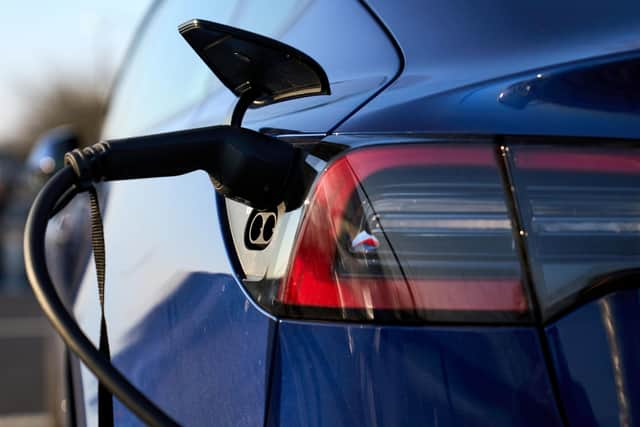Pay-per-mile road tax would be a major mistake by the Government - Jayne Dowle
Now a new report suggests that all drivers could eventually be taxed by the mile to make up for the projected £25bn loss in fuel duty the government could suffer once electric vehicles (EVs) become the most popular car of choice.
This would eventually affect all drivers, not just those who have made the switch to electric, who are currently exempt from paying car tax.
Advertisement
Hide AdAdvertisement
Hide AdHowever, last year, Chancellor Jeremy Hunt announced that from 2025, EV drivers will be forced to pay vehicle excise duty for the first time – with the aim of raising more than £7bn for the Government.


Talk about a lack of joined-up thinking from Westminster.
Did no-one think about the shortfall in public funds when EVs were pushed on us, with former PM Boris Johnson a major cheerleader? Drivers’ organisations and member forums have quite rightly pointed out that it’s unfair for EV drivers to escape road-charging, when their vehicles use the roads. Cash for upkeep of highways has to come from somewhere.
The notion of paying per mile has already been mooted by the Transport Select Committee in 2021, which suggested that per mile road pricing could become an option for the UK. It’s definitely on the table.
Research from motoring organisation the RAC suggests drivers broadly support the principle of ‘the more you drive, the more tax you should pay’. More than a third (36 per cent) say a ‘pay per mile’ system would be fairer than the current regime – although three-quarters (75 per cent) are concerned the Government might use such a system as a way of increasing the amount they are taxed.
Advertisement
Hide AdAdvertisement
Hide AdLet us hope that ministers, always keen to jump on any suggestion which will both fill public coffers and contribute to the stated aim of making the UK net zero by 2050, don’t seize on this idea and run with it. I’m all for shopping local, as the slogan goes, and making the most of what’s on our doorsteps. However, there is a difference between being able to choose and being marooned, especially when it comes to education, work and economic growth.
With public transport already failing to deliver reliable alternatives to driving, too many people, especially in our region, already find themselves priced out of studying or seeking jobs anywhere but within easy distance of their own home.
Those “left-behind neighbourhoods” identified not so long ago by the Government as most in need of so-called levelling up will be not so much left-behind but pushed off the edge of a cliff, with catastrophic results for poverty levels and life chances.
No-one likes to suddenly have to pay for something which they’ve been getting for free for years. With less than 12 months to go to a General Election, it would be unwise to launch anything concrete now.
Advertisement
Hide AdAdvertisement
Hide AdBut the very fact that pay-per-mile is now reaching a potential policy discussion stage should sound a warning bell. It’s yet another example of how Government initiatives on reducing reliance on fossil fuels towards ‘cleaner’ sources of energy are shockingly piecemeal. Never accorded the depth of consideration they should demand, they hang in the air, largely unconnected to other areas, such as the impact they might have on the cost of living crisis, rising interest rates and restricted social mobility.
They would do well to take heed of what’s happening in Germany. What’s being called ‘Boilergeddon’ or the ‘heat hammer’, is seeing a mad rush amongst households to install traditional gas-fired boiler whilst they still can. This rebellion is the upshot of the Coalition government’s new law that plans to ban the installation of new gas and oil-fired boilers in homes from next year.
The result? A collapse in the Government’s poll ratings and an acrimonious stand-off between two of the Coalition partners, the Greens and the Social Democrats, threatening to undermine political stability and the already fragile German economy.
Energy strategy should be the absolute bedrock of all public policy, and in an unstable world, it is ever more important. Yet politicians seem incapable of getting it right. They fail to read the prevailing wind, ignore expert advice and plough on in panic mode. What our politicians should learn from Germany’s troubles, and quickly, is that there is only so far that people can be pushed.